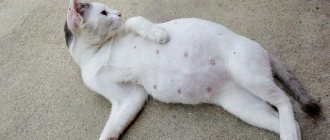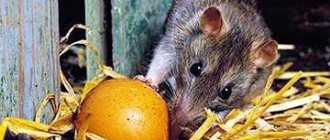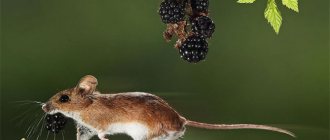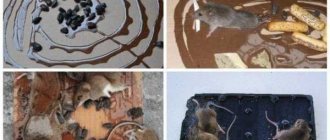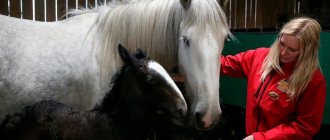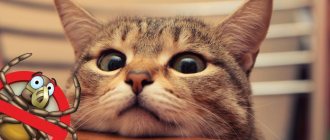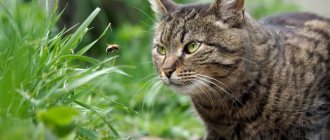When having a cat in an apartment, few people expect it to display hunting instincts. This is, rather, a friend, a beloved family member, for some - a “doctor and psychotherapist,” but not a beast. In the private sector or at the dacha, you may often need the help of a cat in getting rid of uninvited guests - mice. If the expected effect does not occur, and the sounds of grinding and squeaking irritate the residents more and more, you want to just teach the animal to be itself. To be an animal, which even in fairy tales is almost always paired with a mouse.
Yard VS Thoroughbred
The hunting instinct is alive in every cat, regardless of the presence or absence of breed.
But in order to have the honor of being called the best hunter, the degree of expression of this instinct is important. In most cases, a purebred cat catches a mouse simply out of curiosity. She doesn’t try to eat her and doesn’t even always kill her: over the years of selection, breeders have managed to euthanize the cats’ natural inclinations, making these animals more suitable for life in a city apartment. So which cats are better at catching mice? It turns out that they are outbred? However, this is not always the case. Many owners deliberately breed completely domestic mongrel cats, but these cats also live in urban conditions, in apartments, and they see mice no more often than their blue-blooded brothers. If suddenly such a cat catches a rat, it plays with it for a long time, drags it back and forth, without trying to kill it with a precise bite to the back of the head, as real hunters do. And all because, in addition to a pronounced instinct, a cat requires skill. But how to teach a cat to catch mice?
This experiment was carried out back in the 1960s. Four cats and their offspring took part in it. The two cats were pedigree, and the cats for mating were selected accordingly. The other two are skilled hunters living on farms, mated with the same cats. Scientists made a substitution: outbred kittens were placed in purebred cats, and purebred babies were placed in farm cats. When the litters were not even three weeks old, the outbred cat caught a mouse and brought it to “her” kittens. The second yard dog did the same
The hunters taught the purebred kittens to handle their prey with caution and surgical precision. Outbred kittens raised by purebred “mothers” learned only to play, but not to kill - they were not given such an opportunity
As a result, it became obvious which cats are better at catching mice: those that were born and raised in certain conditions, with access to natural prey, raised by rat catchers and with small claws knowing why, in the opinion of hunting cats, nature created mice and other small animals. living creatures
This experience proved that, despite the importance of heredity, upbringing and the conditions for raising litter play a decisive role in the issue of catching rodents.
Therefore, when choosing a future thunderstorm of mice, you should rely on the conditions of keeping the kittens. Ask your neighbors about this question: there is almost certainly a cat living on one of the adjacent plots, whose owners annually adopt kittens born from the gulena
You can bring a rat catcher into a private home directly from the street - a kitten born in the basement already has the necessary skills at the age of three to five months. What breeds of cats catch mice? These are animals of natural proportions, raised in a nursery in a suburban area (with access to the street, and not living in enclosures). These include our Siberians, Russian Blues, Thais, Kuril Bobtails and overseas beauties - Maine Coons, Abyssinians, Bengals, Ocicats, European Shorthairs.
Do genes influence a cat's ability to catch rodents?
The hunting instinct is truly inherited. Kittens born to mousecatchers inherit their parents' tendency to chase and catch small animals. But direct skill, that is, the effectiveness of hunting, develops through practice.
Noticing the pattern of inheritance of traits, breeders secured it through careful selection of individuals for breeding the breed. Thanks to experiments, they managed to achieve the preservation of genes in all subsequent generations.
INTERESTING!
The severity of the hunting instinct depends not only on the breed, but also on the color. The worst hunters are completely white cats.
Other breeds
As a hunter for a private home, you can purchase the following breed of cats:
European Shorthair
Smart, active and inquisitive pets, distinguished by courage and bravery. The European Shorthair cat adapts to any weather conditions and is distinguished by its affectionate behavior.
In the fight against rodents, animals have proven themselves to be ruthless killers. European tabby. The color of the animal is similar to that of a tiger. Tabbies are distinguished by their strong structure and muscularity, have a strong, large head, sharp teeth and claws. The hunting instinct is inherent from birth, so they grow up to be excellent mousecatchers. Turkish Angora. Cats of this breed have snow-white fur and blue eyes. Despite its defenseless appearance, the Turkish Angora tends to live in the yard and lead an active life. Thanks to fearlessness and curiosity, the pet effectively catches mice.
By what external signs can one identify a future mousetrap?
It is believed that a cat that can successfully catch mice must look the part. What signs can be used to determine which kitten will be an excellent rodent exterminator?
Signs of a mousecatcher:
- long mustache;
- wild color - black, red or gray, two or three colors, with faint stripes and spots to blend with nature and remain invisible to its prey;
- short hair – long and thick guard hair when wet acquires an unpleasant odor, which can scare away the rodent;
- large ears and triangular head;
- large paws.
They tried to choose the best rat catcher using these signs several decades ago. In reality, there are no perfect rat hunters. Every cat has a hunting instinct from birth, but not all representatives of the feline family realize it with equal success.
Before you take a kitten into your home to catch mice, you should ask whether its mother was a good hunter. When raising their cubs, cats pass on their skills to them, including in catching rodents.
If the pet was taken from the street, it is highly likely that its hunting skills will be well developed. In purebred pets, the instinct is dulled, especially if several generations of animals have lived in apartments and do not even know what a mouse or rat looks like.
Is it possible to teach a cat to hunt if she doesn't show much desire to catch mice? In order for the animal’s natural instincts to awaken, it is necessary to let the pet feel a slight feeling of hunger. A cat should not be completely deprived of food - this is cruel and fraught with health problems. You just need to reduce the portion size: malnutrition will awaken the instinct in your pet. After the first successful hunt, it is advisable to reward the animal.
You need to teach your pet to hunt from childhood. There is no point in training an adult castrated cat. The purpose of its existence is food and sleep, such animals become lazy and quickly gain excess weight, and it becomes more and more difficult for them to run every year. But you can and should awaken a kitten’s interest in hunting. To do this, catch the mouse using a mousetrap and let your child play with it while it is still alive.
To activate the kitten's hunting instinct, you should play with it more often using a laser pointer or special toys. If your pet tirelessly chases them, he will become a professional in catching mice.
How to let your cat know what is expected of him
If it is important for the owner for the cat to fulfill its direct natural purpose, it is worth trying to teach it to be a hunter.
Advice from experienced people contains different sequences of actions. The first ones recommend starting with developing a feeling of hunger. By keeping the animal on a “starvation diet” for some time, you can provoke it to go in search of food on its own.
Other experts recommend starting with developing the skills of agility, swiftness, attentiveness and tenacity. When a cat feels strong, she will become interested and want to show it in hunting. For training, you can use an artificial mouse, which you can quietly pull on a string, teasing and captivating the future hunter. You can pick up a live mouse that is not the first freshness, for example, the one that the neighbor’s cat caught.
According to others, the instinct to catch mice should be developed through stimulation. For each mouse caught, the animal should receive some kind of reward (a treat, a favorite pastime, a toy, etc.). Then he will have a natural interest in a process that promises new pleasures.
Finally, the fifth group of “cat experts” is of the opinion that the cat is an extremely intelligent animal. It always understands what is expected of it, but it doesn’t always want to do it. If you praise her, please her in every possible way, celebrate all her good deeds, but at the same time make it clear what is expected of her, she will definitely thank her for her kind attitude with caught living creatures.
Character and behavior of lop-eared animals
The Scotsman is a purebred cat that is distinguished by its kind disposition. Distinctive behavioral traits:
- communication skills and sociability;
- love for children;
- gaiety;
- easy to educate with the right and friendly approach;
- actually cannot be trained;
- playful;
- not mischievous;
- they quickly forget bad things and do not take revenge.
Scottish Folds are an ideal option when there are other animals and children in the house. Such kittens are real aristocrats with their mannerisms and waywardness. Their restiveness and capriciousness are often observed. If the Scots want something, they will definitely achieve it. An adventurous breed with a curiosity for the unknown. When new people appear on their territory, Scottish cats are not very friendly, but then they begin to communicate. Scots love to play, but are not particularly happy with cuddling and cuddling.
Hantavirus infections
Several species of rodents are known to carry hantavirus. Cats can be infected with hantavirus but do not show any symptoms, so the virus is not harmful to them. Additionally, cats cannot transmit hantavirus to humans.
However, humans can be exposed through contact with infected rodents. 6 Although serious complications caused by hantavirus are uncommon in humans, exposure can lead to a serious illness called hantavirus pulmonary syndrome.
How to teach a cat to catch mice
In order for a cat to catch a mouse, it is necessary to initially raise the kitten correctly. At birth they do not have the necessary skill. The mother cat does the upbringing. To develop a hunting character in your pet, you need to train it from an early age.
Some people mistakenly believe that if you don't feed the rat catcher cat before hunting, the cats will catch rats faster and in greater numbers. In fact, the pet needs food to generate energy for hunting.
A hungry cat will have a more difficult time completing the task. If you want a happy cat with a mouse in its teeth to not be a rare occurrence for you, then you shouldn’t starve it.
How to make a cat catch mice: do not overfeed the rat catcher's cat, do not make the rat catcher's cat starve. In addition, you need to reward your pet if it catches a mouse or rat.
Play with your cat using live bait. Catch rodents in mousetraps and give them to your cat. Do not use poison for catching, you can harm the health of your pet.
What to do if the cat does not catch mice:
- Understand the reason for this behavior. Perhaps your pet is sick with something. Visit your veterinarian.
- Feed properly in small portions 5-6 times a day.
- Perhaps sterilized animals have an incorrect diet, create a dietary menu.
It is quite difficult to train a kitten to catch mice, so the mother takes responsibility for raising the kitten. At what age do kittens begin to catch mice? The ideal period for this is 4-5 months.
Keep in mind that your pet needs to be vaccinated before engaging in rodent control. The main one is the rabies vaccination. If your pet is bitten by a rat, immediately take it to the veterinarian for an examination.
At what age does a kitten begin to catch mice on its own?
Let’s not keep the intrigue going and answer right away: a kitten becomes a hunter at three months.
Now let’s tell you in a little more detail how, who and when teaches kittens to hunt.
We got our own cats not only for the sake of their beauty and cuteness. We were plagued by mice, gnawing everything they could in the house and garden. With the advent of cats, the problem was solved.
Now we have two cats and a male cat living with us. They grew from kittens into adult hunters before our eyes, and this always happened in three stages and according to the same pattern:
1.
When the kittens are
a month
, the cat catches and brings into the house the first mouse for her babies. The kittens are still too tiny to play with her, so the first acquaintance comes down to sniffing, and sometimes they can timidly touch her with their paw.
2.
At
two months,
the mother cat brings another mouse, and already then the grown kittens begin to excitedly chase after it, play and take prey from each other.
3.
When the kitten turns
three months
, he brings his first independent hunting trophy into the house.
Today, kitten Kazimir caught his first cockchafer-sized mouse in the garden and proudly laid it at our feet during breakfast.
Then he tormented his prey for a long time and recklessly. A worthy heir to Mitrich, the founder of our cat pride, is growing up.
By the way, we noticed that as cats age, they become less inclined to hunt mice. The best hunters are teenagers under one year old. In the photo below you can see how the five-month-old Turtle (Kazimir’s mother) is chasing a mouse around the kitchen, and her parents - red-haired Mitrich and Marusya - lazily watch her, without interfering in the game.
Source
Who is the best hunter - a cat or a cat?
Who is better at catching rodents - a male or a female? It is believed that the best rat hunters come from stray cats. Maternal instinct forces the female to hunt, and the cat hones her skills to perfection.
Males are not as active as cats. Their main task is procreation; for this, the cat needs to interest and attract the female. However, a cat deprived of food, forced to rely only on itself to solve the “food issue,” is guided by instinct and becomes an excellent hunter.
Cats hunt mice and rats most actively about once a quarter, before the approach of estrus. Consequently, about 3-4 times a year, a pet can clear a house or apartment of uninvited guests. The best candidate for the position of mouser is considered to be a cat.
Recommendations
A hunting cat spends a lot of time outdoors, in contact with other animals, which increases the likelihood of infection and the development of diseases. To protect your pet from diseases, you need to remember the following rules:
- the cat must be periodically vaccinated against potential diseases;
- the pet needs to be fully fed and fortified with vitamin supplements, which will strengthen the immune system;
- every 5 months, clean your pet of worms for the purpose of prevention;
- the animal needs to buy a flea collar that prevents the spread of parasites;
- in early spring, before a walk, it is recommended to treat your pet’s fur with protective sprays, since in May the likelihood of insect attacks increases.
For preventative purposes, you can take your cat to the veterinarian for examination once every six months.
How does castration affect the hunting instinct?
Owners of apartments in urban high-rise buildings are not particularly concerned about the loss of hunting skills in their cat after sterilization. But for owners of private houses this topic is extremely relevant. How does the castration or sterilization procedure affect an animal’s ability to kill rodents?
The decision to neuter a cat will not greatly affect its hunting instincts. Cats before and after castration exterminate rats and mice in the territory entrusted to them with equal eagerness and skill. The exception is castrati who are overweight, which appears due to a sedentary lifestyle and too high-calorie diet. It is difficult for such pets to move, and their hunting skills are gradually reduced to zero.
Since the ability to hunt in cats is inherent at the level of instinct, it is difficult to influence it by sterilization. After the procedure, the animal may become less active and mobile, go out hunting less often, but this will not make the ability to track and catch a mouse disappear.
While cats often become fat and lazy after castration, spayed females, on the contrary, show more interest in hunting. Many cat owners claim that after their pet has become infertile, it goes hunting more often and brings its owners the trophies it catches. In addition, having lost interest in the opposite sex and not spending time and energy on bearing and feeding offspring, the cat directs all its energy to satisfying the hunting instinct.
In general, a tendency towards hunting and active games can be identified in an animal even in childhood. If, as a kitten, the pet is not distinguished by curiosity, nimbleness and activity, it is unlikely that in adulthood, especially after castration, it will be drawn to adventures. Typically, castrated cats become more obedient, calm and balanced.
